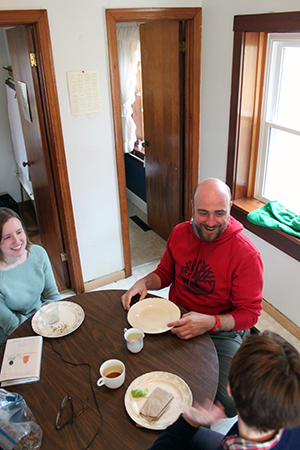 What is the basis of real spiritual community? A large number of people showing up on Sunday morning? Having a deep spiritual experience, whether in a worship service or in personal devotions? Or is it a dedicated commitment to live a certain way and follow the rules?
What is the basis of real spiritual community? A large number of people showing up on Sunday morning? Having a deep spiritual experience, whether in a worship service or in personal devotions? Or is it a dedicated commitment to live a certain way and follow the rules?
All of these elements show up in the story of Jesus. Lots of people certainly showed up to hear him preach. At times, Jesus seems like some kind of homeless mega-church pastor. So many people come to hear him that he often has to run away or get in a boat just to find some breathing space! Yet, it seems clear that Jesus’ most important ministry is not with the crowds.
Throughout Jesus’ ministry, there are regular signs and wonders, healings, and deep times of spiritual reflection and religious experience. Yet, as important as these dramatic moments are, personal experience for its own sake does not seem to be the most essential part of Jesus’ message.
Jesus asks very hard things of his followers. He tells them that for a person to enter the kingdom of heaven, their righteousness will have to exceed that of the scribes and Pharisees – those best known for following all the commandments of Torah down to the letter. Yet, Jesus is not slave to rules and regulations. He and his disciples regularly break the Sabbath in order to accomplish their mission of love. Jesus challenges the ruling authorities, and is eventually executed as an outlaw.
 Jesus is neither a crowd-pleaser, experience-addict, nor a legalistic rule-follower. What is he? What lies at the heart of his ministry?
Jesus is neither a crowd-pleaser, experience-addict, nor a legalistic rule-follower. What is he? What lies at the heart of his ministry?
Jesus’ ministry is not about breadth of numbers, but depth of commitment. It is not about highs of ecstasy, but patient endurance and willingness to suffer for truth. The model that Jesus offers is not a list of rules that makes me feel safe, but rather a dangerous invitation to become his disciple, his friend. He calls me to become like he is and walk as he did.
As a friend of Jesus, my work is not to gather crowds; I am to make disciples. Jesus calls me to break my addiction to religious experiences, to move beyond the fluctuations of hormones and emotion and embrace true love. I can no longer justify myself through head-knowledge and checklist morality. Instead, the Spirit invites me to embrace the mystery of who Jesus is, allowing him to humble me and fill me with his character.
What would it look like to live in communities where this kind of disciple-making could take place? Instead of measuring our faithfulness by numbers of worship attendance, what if we focused on the people that we are able to actively mentor and partner with in discipleship?
As an alternative to the rule-book mindset we find in much religion, what if we emphasized the radical power of a living relationship with Jesus? (He’s risen from the dead, not entombed in a book!) What would it look like to be part of a community that honored spiritual experiences, but valued the fruit of the Spirit – love, joy, peace, patience, kindness, generosity, faithfulness, gentleness, and self-control – even more?